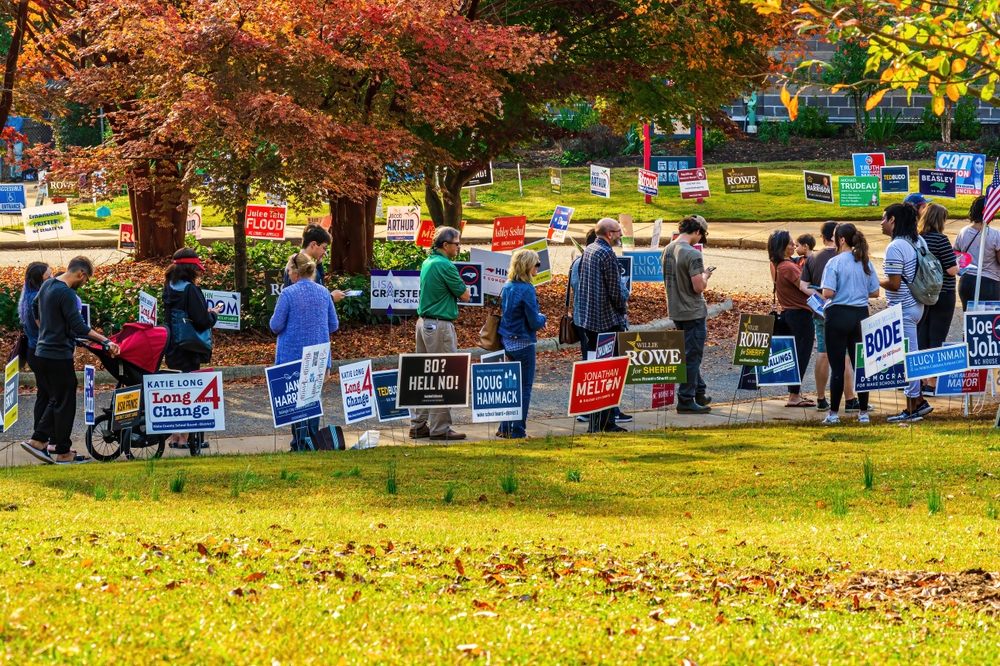Supreme Court Considers Unraveling The Basics Of Democracy in Moore v. Harper

Longer lines to vote, like this scene of North Carolina voters waiting to participate in the 2022 midterms, are one of many expected consequences if the Supreme Court gives state legislatures unchecked power to restrict access to the polls. CREDIT: Shutterstock/Wileydoc

Any standard U.S. civics class teaches that in both our federal and state systems of government, there are three branches with a system of checks and balances between them. For example, if a legislature passes a bill that violates its constitution, courts can respond by overturning that law. But what if there were an arbitrary exception where there is no check on lawmakers’ actions?
That’s the premise of an astounding and dangerous case being argued before the Supreme Court next week. In Moore v. Harper, North Carolina’s Republican state lawmakers are contending that the state’s supreme court has no authority to check the legislature on matters related to federal elections, including their attempts to draw racially gerrymandered maps as part of the redistricting process. This has been named the “independent state legislature theory” (ISL), referring to the concept of state lawmakers being “independent” to make decisions without being checked by the courts.
ISL, they posit, has been written into the U.S. Constitution since the founding of the nation because the Elections Clause states: “The Times, Places and Manner of holding Elections for Senators and Representatives, shall be prescribed in each State by the Legislature thereof.” Proponents argue this language isn’t just delegating how to manage elections to the states, but that it’s specifically giving unchecked authority to state legislatures to make those decisions without being subject to review by their own state courts.
If this has been in the Constitution since 1787, it apparently took 213 years for anyone to even notice it or care. In the 2000 decision Bush v. Gore, in which the Supreme Court handed the presidential election to popular vote-loser George W. Bush, Chief Justice Rehnquist ignited interest in ISL when he suggested in his concurring opinion that “the text of the election law itself, and not just its interpretation by the courts of the States, takes on independent significance.” Joined by fellow conservatives Justices Scalia and Thomas, Rehnquist wrote that “this inquiry does not imply a disrespect for state courts but rather a respect for the constitutionally prescribed role of state legislatures.”
Since then, the sentiment of ISL has blossomed as a path for Republicans to further limit access to the polls. That was never truer than immediately after the 2020 election, when President Trump urged state legislatures to overturn election results to make him the winner. Technically, ISL theory would not actually allow states to do this; however, Trump’s pressure created even further incentive for conservatives to claim more control over elections in the states. That’s why this year’s midterm elections featured many Trump-supported election deniers running for secretaries of state positions, hoping to control future elections. Thankfully, they overwhelmingly lost.
Nevertheless, conservatives’ fight for ISL continues with hopes to greatly erode access to democracy. In this election, we saw several states proceed with maps that were heavily gerrymandered along both racial and political lines to favor Republicans. The U.S. Supreme Court used the shadow docket to let maps remain in place even when lower court judges determined the maps violated the Voting Rights Act’s requirements of ensuring proportional racial representation. In some cases, like Wisconsin, the conservative state supreme courts endorsed maps that were clearly gerrymandered to help Republicans. In Ohio, the state supreme court ruled six times that the Republican-drawn maps were unconstitutional, yet the election proceeded with one of them anyway. In Pennsylvania and North Carolina, the state supreme courts played an important role in blocking gerrymandered maps.
But of course, that’s why North Carolina Republicans are bringing this case. They don’t want to be held accountable by their state’s courts for trying to rig maps to preserve their power. They’re hoping the U.S. Supreme Court will hand them a free pass that has apparently been hiding in the Constitution for 235 years. This would escalate a vicious cycle already underway in which Republican justices help Republican lawmakers rig elections, and then when Republican lawmakers win those elections, they secure even more Republican judges on the bench.
If the Court agrees, we can certainly expect to see Republicans create even more egregiously drawn maps that disenfranchise voters, but also other efforts to limit access to the polls. That would likely include voter ID, scaling back early voting and mail-in voting, and additional tactics that conservatives have regularly deployed to suppress turnout. While these schemes are often couched as protecting elections, they contribute very little — if anything — to election security, but they certifiably make it it harder for many people, especially voters of color, to have their votes counted.
And though the bogus theory of ISL supposedly has limitations, there’s every reason to believe that state legislatures might nevertheless feel emboldened to try going farther and possibly even attempt to overturn the will of the voters. At best, litigating ISL claims would be a legal mess that further undermines trust in our election process and gives conservatives even more ammunition for their baseless fear-mongering narratives about election security.
We should remember the lessons of our civics classes. There must be checks and balances to maintain our republic and democratic ideals, and the Supreme Court should quickly and profoundly reject North Carolina’s ISL claims. It will be a huge blow to our democracy if they don’t.
Oral arguments in Moore v. Harper are scheduled for December 7 and audio will be livestreamed on the Court’s website.
Zack Ford is the Press Secretary at Alliance for Justice.
